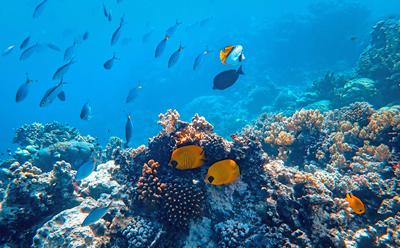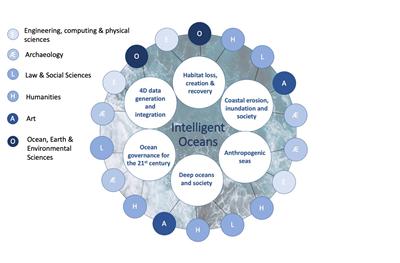New researchers to explore our future relationship with the world’s oceans

The University of Southampton, with support from the Leverhulme Trust, is launching a new programme which will focus on how we could and should engage with the world’s oceans and seas over the coming decades.
The Leverhulme Trust has awarded the University’s Southampton Marine and Maritime Institute (SMMI) £1.35m to support 15 PhD positions over six years, under the overarching theme of ‘Intelligent Oceans’. Each scholarship is funded for up-to 4 years at equivalent levels to that of UK public funding agencies (including fees, stipend and additional funds to support research), with the first set of students due to enrol in Autumn 2021.
Intelligent Oceans Leverhulme Trust Doctoral Scholars (LTDS) will be drawn from a range of academic disciplines; from Archaeology to Engineering – Ocean and Earth Science to Computing.
They will address some of the greatest challenges our species has seen in its 300,000 year history; exceeding planetary capacity, anthropogenic climate change, increasing levels of inequality and tension within and between populations.

In 2016, the first UN World Ocean Assessment concluded that we are running out of time to generate sufficient knowledge and understanding to manage our oceans sustainably. Yet oceans and seas are one of our greatest assets and central to human life: 40 percent of the world’s population live within 100km of the sea, 90 percent of our goods are traded across it (generating gigatons of CO2), it regulates our climate and encapsulates an archive of human life on earth.
Intelligent Oceans will target critical issues facing society; from the cross-cutting impacts of coastal change, through the implications of increasing exploitation of the deep ocean, to the emergent complexities in managing and governing ocean space in the 21st Century.
Professor of Archaeology and programme leader, Fraser Sturt, comments: “Socially, legally and scientifically, decision making and knowledge gathering relating to the oceans and seas occurs in a different way to that of terrestrial and even extra-terrestrial contexts. The result is that knowledge has been fragmented along disciplinary and legislative boundaries – limiting the range of ideas and approaches used. The Intelligent Oceans programme will seek to counter this problem – co-creating projects to address pivotal challenges facing society through a lens of marine and maritime activity.”
The programme is led by Professor Fraser Sturt, Deputy Director of SMMI and Professor of Maritime Archaeology in the Faculty of Arts and Humanities. The leadership team is drawn from across the University including Susan Gourvenec (Engineering, FEPS); Damon Teagle (OES, FELS); Blair Thornton (Engineering, FEPS); Sabu Padmadas (Demography, FSS); Emily Reid (Law, FSS); Stephanie Jones (English, A&H); Larry Lynch (WSA, A&H).